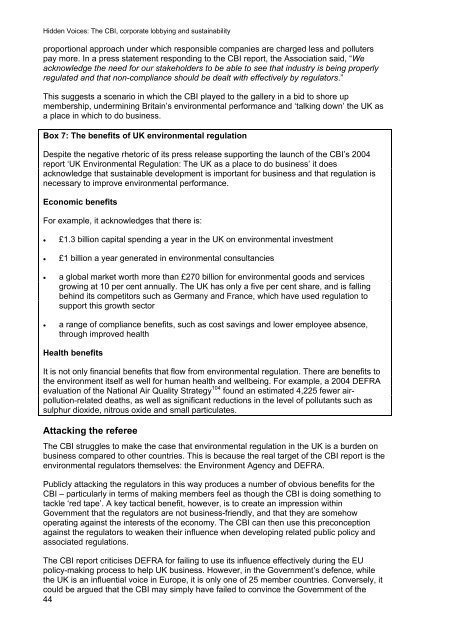hidden_voices
hidden_voices
hidden_voices
Create successful ePaper yourself
Turn your PDF publications into a flip-book with our unique Google optimized e-Paper software.
Hidden Voices: The CBI, corporate lobbying and sustainabilityproportional approach under which responsible companies are charged less and polluterspay more. In a press statement responding to the CBI report, the Association said, “Weacknowledge the need for our stakeholders to be able to see that industry is being properlyregulated and that non-compliance should be dealt with effectively by regulators.”This suggests a scenario in which the CBI played to the gallery in a bid to shore upmembership, undermining Britain’s environmental performance and ‘talking down’ the UK asa place in which to do business.Box 7: The benefits of UK environmental regulationDespite the negative rhetoric of its press release supporting the launch of the CBI’s 2004report ‘UK Environmental Regulation: The UK as a place to do business’ it doesacknowledge that sustainable development is important for business and that regulation isnecessary to improve environmental performance.Economic benefitsFor example, it acknowledges that there is:• £1.3 billion capital spending a year in the UK on environmental investment• £1 billion a year generated in environmental consultancies• a global market worth more than £270 billion for environmental goods and servicesgrowing at 10 per cent annually. The UK has only a five per cent share, and is fallingbehind its competitors such as Germany and France, which have used regulation tosupport this growth sector• a range of compliance benefits, such as cost savings and lower employee absence,through improved healthHealth benefitsIt is not only financial benefits that flow from environmental regulation. There are benefits tothe environment itself as well for human health and wellbeing. For example, a 2004 DEFRAevaluation of the National Air Quality Strategy 104 found an estimated 4,225 fewer airpollution-relateddeaths, as well as significant reductions in the level of pollutants such assulphur dioxide, nitrous oxide and small particulates.Attacking the refereeThe CBI struggles to make the case that environmental regulation in the UK is a burden onbusiness compared to other countries. This is because the real target of the CBI report is theenvironmental regulators themselves: the Environment Agency and DEFRA.Publicly attacking the regulators in this way produces a number of obvious benefits for theCBI – particularly in terms of making members feel as though the CBI is doing something totackle ‘red tape’. A key tactical benefit, however, is to create an impression withinGovernment that the regulators are not business-friendly, and that they are somehowoperating against the interests of the economy. The CBI can then use this preconceptionagainst the regulators to weaken their influence when developing related public policy andassociated regulations.The CBI report criticises DEFRA for failing to use its influence effectively during the EUpolicy-making process to help UK business. However, in the Government’s defence, whilethe UK is an influential voice in Europe, it is only one of 25 member countries. Conversely, itcould be argued that the CBI may simply have failed to convince the Government of the44


